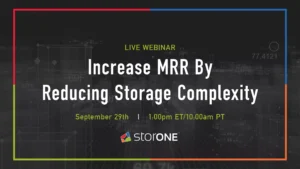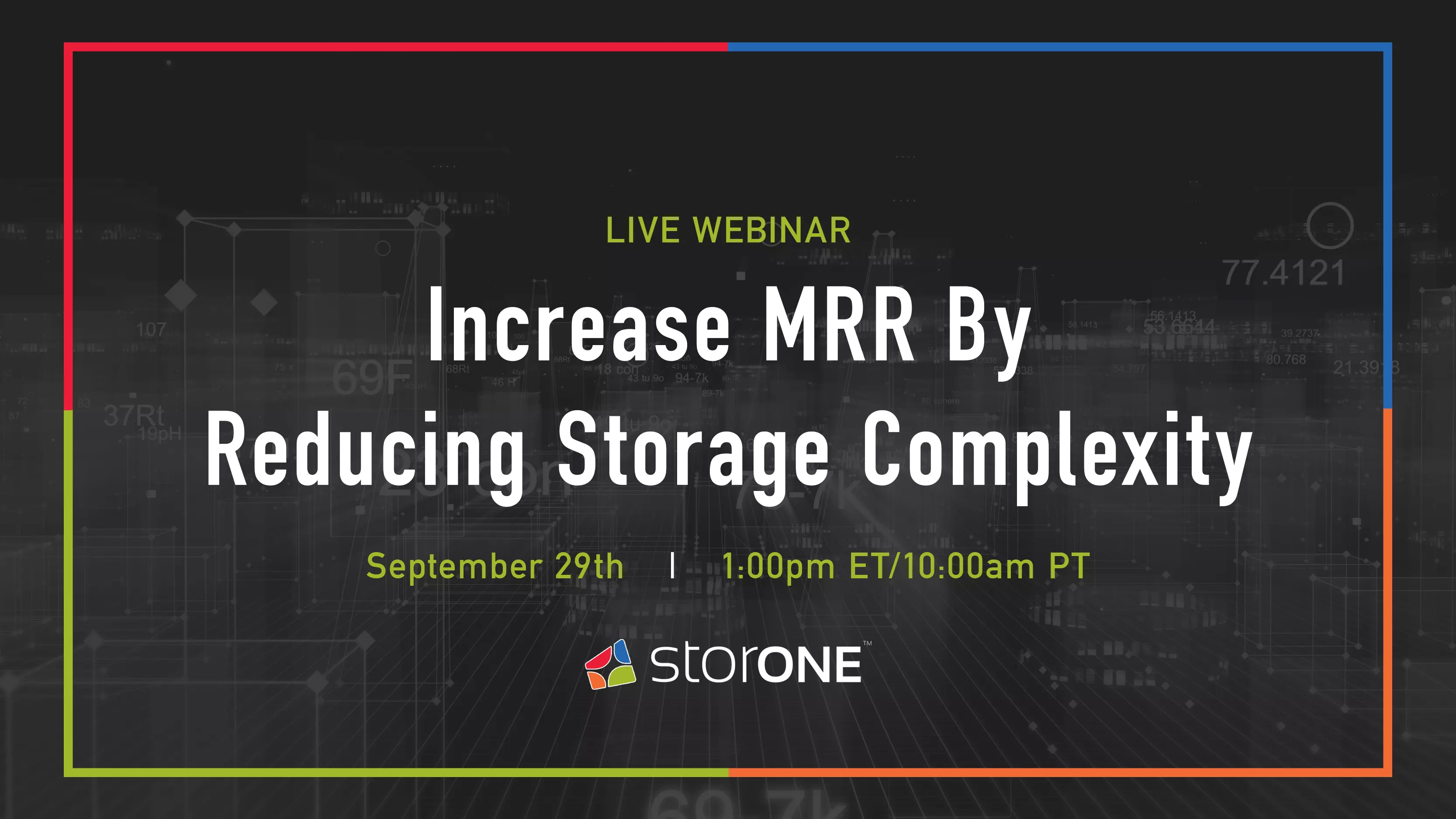To increase their monthly recurring revenue (MRR), Managed Service Providers (MSPs), must focus on overcoming MSP storage challenges. These organizations typically start with a particular area of specialization, such as backup, or virtual desktop infrastructure (VDI), and then try to increase their MRR by offering additional services to those customers while also continuing to onboard new customers. The problem is that each new service offering often requires a storage system different than the original.
MSPs deal with potentially the worst case of storage sprawl. Not only are they managing five to six different storage systems, but each customer is also using some or all these systems. Overcoming MSP Storage challenges require that they follow a unique set of guidelines.

MSPs Must Consolidate Storage
Storage Sprawl tops the list of MSP storage challenges. Adding a storage system for each new service offering cuts into its potential profitability and may even add so much operational overhead that it makes other service offerings less profitable. To overcome sprawl, MSPs must look for a storage system that can support multiple workloads and consolidate the infrastructure into a single storage solution. Today’s storage hardware (controllers and media) can support multiple use cases simultaneously. The problem is that the traditional storage software, common in today’s storage systems, is not optimized to use high-performance flash drives or high-density hard disk drives efficiently. StorONE’s architecture rethinks storage I/O for maximum hardware efficiency and utilization. Where other vendors throw hardware at the problem, StorONE throws efficiency. The results are lower costs and reduced data center footprint requirements.
However, the variety of MSP use cases is extreme, ranging from backup to virtualization to databases. An MSP storage solution must not only be able to support this range of I/O profiles but also ensure that one workload does not starve another for resources. StorONE’s Virtual Storage Containers (VSC) enable MSPs to create storage tenants per service or clients within the service. Each VSC can have a unique performance profile, drive redundancy setting, and data protection configuration. VSCs can be templated, dramatically reducing management overhead, provisioning time, and eliminating configuration mistakes.
MSP Storage Must Be Ransomware Resilient
Ransomware is a problem for every data center, but the problem is magnified in the MSP data center. A breach means that dozens, maybe even hundreds of businesses are now at risk. MSPs are becoming high-profile targets. MSPs have the added challenge of customer mistakes leading to a breach, even if the MSP has followed all the best practices. Customers will still expect the MSP to recover their data.

Protection against an attack is an excellent first step, but eventually, an attack will work through its defenses, and MSPs will need a ransomware recovery strategy. That strategy must include frequent data protection captures, immutable storage of protected data, and an isolated recovery environment. With these components in place, the MSP can return its customers to a safe and fully operating environment within minutes.
StorONE offers its 360° Data Protection capability, which enables organizations to continuously protect data and store the protected copies in a space-efficient, immutable state. If a ransomware attack hits a customer’s VSC, the MSP can use the immutable copies to return the customer to production within minutes of the attack.
MSP Storage Must Be Flexible
MSP growth is hard to predict; it can come in spurts as the MSP launches new services or slow and steady as it adds new customers. MSPs need the flexibility to accommodate these conflicting growth patterns. They need to be able to granularly add capacity and performance in response to growth. The storage solution should not force them into using a specific media manufacturer, type, or capacity. It should also not force the MSP to add entire shelves or nodes. MSPs require the flexibility to meet today’s needs today, and the scalability to meet tomorrow’s needs tomorrow.
With StorONE, MSPs can add flash or hard disk drives from various manufacturers and of different densities. The MSP can add as few of these drives as the storage enclosure allows. Even though the drives are mixed, the MSP enjoys the full performance and capacity of those drives. StorONE’s VSCs extract the drive hardware from the MSP service or customer use case.
MSP Storage Must Be Future-Proof
Migrating data from an old storage system to a new one is challenging for any organization. The storage migration challenge for MSPs, again is magnified because they are not only moving data but also moving customers’ data. One mistake can cost them. The best migration is no migration; the storage solution should adapt and evolve, eliminating storage refreshes and migrations.

StorONE’s ability to use VSCs to abstract storage hardware from the applications it services enables MSPs to add new hardware gradually. Administrators can add newer, higher-density, or higher-performing drives as they become available. If a drive reaches the end of life, remove it, and StorONE’s vRAID technology will automatically rebuild the new drive in record time (minutes for flash drives and a few hours for hard disk drives).
StorONE’s efficiency delivers massive performance and scalability from mid-range servers, which we turn into storage controllers. Those controllers will age out, and you may need more motherboard bandwidth in the future. With StorONE, MSPs can non-disruptively replace storage controllers and seamlessly move to next-generation PCIe buses.
Conclusion
Overcoming MSP Storage challenges is possible with StorONE. An MSP adopts a storage strategy built on a modern single storage engine. This engine can provide a broad portfolio of solutions supporting a wide range of workloads that can increase MRR without reducing profit margins. At the same time, they can improve their ransomware resiliency to the point that it can become an additional service offering within the MSP.
To learn more, register for our webinar “Increase MRR by Reducing Storage Complexity”, live on September 29th at 1:00 PM ET / 10:00 am CT.




